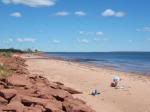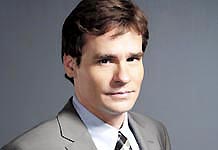4th Canadian Book Challenge; Giller Shortlist 1998
Newfoundland joined Canada in 1948 after a referendum. Joey Smallwood was the first premier of Newfoundland, which made him a Father of Confederation. He died in 1991. That about sums up my knowledge of Newfoundland history, in relation to Canada, at least until I read this book. Johnston has written a book for Newfoundland that covers the life of Joey Smallwood, born in 1900.
It's epic, as is Newfoundland.
On the other hand, I was an islander. I wondered, if like [my father], I would be so bewildered by the sheer unknowable, unencompassable size of the world that I would have to come back home. How could you say for certain where you were, where home left off and away began, if the earth that you were standing on went on forever, as it must have seemed to him, in all directions? For an islander, there had to be natural limits, gaps, demarcations, not just artificial ones on a map. p 132
I, living on an island, completely understand this passage. Johnston has a way of letting the reader see Newfoundland, along the railway, in the outports, or in St.John's. And Joey Smallwood was a Newfoundlander to the core. Based on the wikipedia article, he described his character and all the conflicts in Smallwood very well. I had to read the article to get an idea of what was real and what wasn't.
Here's what I was surprised wasn't real. The main conflict for Smallwood, other than wanting to be remembered for something, was his obsession with a local reporter, Sheilagh Fielding. They had gone to school together and an incident, reminiscent of Robertson Davis' Fifth Business, haunts them. Smallwood was from the wrong side of the tracks but was given a chance to attend a tony prep school and always wanted to be famous, to show 'them' he was worth something. The incident with Prowse (the rich guy), Fielding, and Smallwood makes up a bit of a mystery that stitches its way through the novel. But Fielding wasn't a real person. I didn't like that. She was an obsession for Smallwood. He was almost portrayed as asexual, except for his dealings with Fielding. This seemed to go against his character and if I was a family member, this would bother me. His real wife, Clara, is barely mentioned in the story.
The Fielding character provides the humour for sure. Her articles were dry and biting. She was also writing a concise history of Newfoundland, and I'd love to read her take on the history of any province, or Canada. It certainly could have livened up Canadian history in high school if it had been written by Fielding.
I liked how the author managed to include a lot of Smallwood's real life, and it was his interactions with the people of Newfoundland that I liked best. The real history, not the made up stuff. The made up stuff was well written, with a mystery that I didn't suspect but was rationally explained, with fascinating characters. I just didn't think it belonged in the book. Once I realized Fielding was a made up character, I questioned everything, which defeats the point of a historical novel for me. I would encourage any one interested in Newfoundland history to have a look at this epic novel, but to be aware that not all is true. (And I know, it's fiction, but historical fiction should not make up major parts.)







